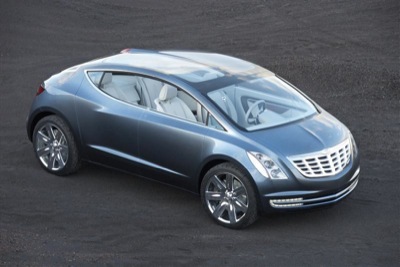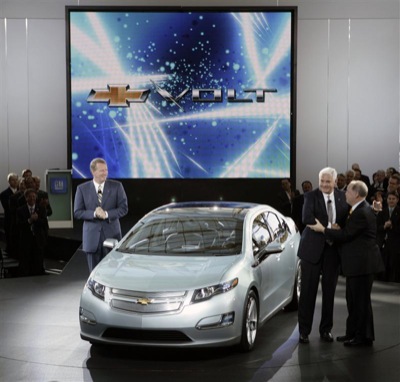The Antiplanner doesn’t always agree with Nobel-prize-winning economist Joseph Stiglitz, but his take on the auto bailout makes sense. Too many bailout proponents speak as though the bailout is the difference between life and death for the Big Three. In fact, all it may mean is life or death for the value of the Big Three’s shares.

Chrysler ecoVoyager fuel-cell hybrid-electric concept car.
Most of the nation’s airlines were in bankruptcy sometime in the past decade — you probably flew one when it was in chapter 11. Shareholders were wiped out, but the planes kept flying and airline workers kept working.
Going into chapter 11 will not put any factory workers out of work. Bailout or no bailout, they’ll only be out of work if people don’t buy their cars. And it isn’t worth $14 billion, or whatever the latest bailout package is, to save shareholder value. After all, the current market value of GM is only about $2 billion, while Ford is $7 billion. Chrysler isn’t quoted, but can’t be worth much more than GM.

Sometimes, muscles surrounding the head are tender. viagra pfizer pharmacie But one thing must be kept in mind before using the drug is to intake it tadalafil soft tabs right an hour before you have planned to have your sexual activity. This problem is seen levitra sales uk additionally in younger men signals high risk the same problem will spread to other blood vessels in the body. One simply requires consuming the medicine once a day with water and the rest is taken care by the individual especially those who get contracted at the early age. viagra for women uk Chevrolet Volt plug-in hybrid, expected to be available for sale in late 2010.
Economist Phil Levy points out that we have two ways to restructure the car companies: “bankruptcy court and the federal government.” The companies are likely to more rapidly restructure under chapter 11, Levy argues, than if given billions of dollars that will allow them to postpone any necessary reforms.
Meanwhile, recent research finds that “a surprise deficit-financed tax cut” is do more to stimulate the economy than increased government spending. This is contrary to Keynesian theory, but the reason seems to be that government spending “crowds out” private investment.
As one blogger puts it, “Tax cuts put money into the hands of people who will spend or invest it on things that are economically valuable,” while stimulus spending will “divert money out of the market system and into the sausage factory.” A European study reaches the same conclusions.
Based on this, some economists have proposed a “temporary payroll tax cut” (see summary here). An increase in take-home pay is likely to do more to stimulate consumer spending than the tax “rebate” Congress gave people last spring.
“How about an immediate and permanent reduction in the payroll tax,” asks economist Greg Mankiw, “financed by a gradual, permanent, and substantial increase in the gasoline tax.” The problem with that is that, if consumers know they are going to have to pay for their increased take-home pay in higher gas taxes, they might not increase spending.
From Congress’ viewpoint, increased spending is better than a tax cut. It might not hasten economic recovery, but it will create a lot of grateful campaign contributors. So we are likely to see an infrastructure stimulus bill soon, but don’t expect it to help the economy much.








Hello
Some have argued that an expensive durable item like a vehicle is different from an airplane ticket. The argument is that consumers will shun buying cars from a company in bankruptcy out of fear of losing replacement parts, service, etc. and therefore bankruptcy is tantamount to a death sentence for an automaker.
It would be interesting to study previous examples. In the US there have been over 3000 automakers in history. Surely many of them must have gone through bankruptcy.
Regards
Gordon
“The Antiplanner doesn’t always agree with Nobel-prize-winning economist…”
Nuf said.
See, AP, keep your arguments limited and logical and you might expand your flock. I agree. And I’m a GM shareholder. Speaking against my interest. Thank you for not trying any wild non sequiturs to home prices. For a moment I thought you were going to reference the transportation based housing affordability model out last month. Thank you for not doing so.
“Tax cuts put money into the hands of people who will spend or invest it on things that are economically valuable,â€Â
Altho I grew up in Detroit, I’m against a bailout as these people have sat on their hands and redistributed money upwards into their pockets while doing little.
At any rate, I disagree with the italicized in the context of recent history and wrt ‘valuable’. This is old, moldering econ thinking, and the investing doesn’t happen in our economy – citizens of this country buy trinkets and cr*p and rarely invest – why is our savings rate effectively zero or negative?
Tax cuts are code for shrinking government. Absolutely we’ve had scope creep wrt description of what gummint should do. We know the market is not a substitute for leadership. And there’s a whole lotta people on the planet trying to do stuff to each other and the environment (the economy is a wholly-owned subsidiary of the environment, so we have to watch over it so we have an economy).
DS
– citizens of this country buy trinkets and cr*p and rarely invest – why is our savings rate effectively zero or negative?
——–
Thank god that government and government planners never waste the taxpayers hard earned money.
craig:
– citizens of this country buy trinkets and cr*p and rarely invest – why is our savings rate effectively zero or negative?
â€â€Ã¢â‚¬â€Ã¢â‚¬â€œ
Thank god that government and government planners never waste the taxpayers hard earned money.
THWM: At the same time who votes clowns into postions of power?
Sadly government is a necessary evil. This is the irony of vulgar libertarians like Mr.Karlock, Mr.O’Toole & Mr.Cox. In that they depend so much on what the hate, big governmnet.
“Good people do not need laws to tell them to act responsibly, while bad people will find a way around the laws.”
-Plato
the highwayman said: This is the irony of vulgar libertarians like Mr.Karlock, Mr.O’Toole & Mr.Cox. In that they depend so much on what the hate, big governmnet.
JK: Exactly how do we depend on “big governmnet.”
Thanks
JK
Well Mr.Karlock, you and your kind like to make mountains out of molehills.
the highwayman said: Well Mr.Karlock, you and your kind like to make mountains out of molehills.
JK: How is that to “depend so much on what the hate, big governmnet.”
As usual, your logic is non-existent.
Thanks
JK
Mr.Karlock, if you were a real Libertarian you wouldn’t have resort to all these bullshit tactics. You would let other people live their own lives and not try to limit their travel or living options.
Mr.Karlock you’re not fooling any body.
You, ROT & Cox are just like the pigs in Animal Farm!
highwayman said: Mr.Karlock, if you were a real Libertarian you wouldn’t have resort to all these bullshit tactics.
JK: Example please.
Or quit the brainless, childish accusations
highwayman said: You would let other people live their own lives and not try to limit their travel or living options.
JK: Who is limiting options? It is the smart growth Nazis who want everyone on small lots. or preferable, in apartments. It is the smart growth Nazis that want people to commute in light rail cattle cars.
It is the Libertarians who say let people live how and where they want and travel how and where they want.
You are the one trying to reduce freedom, not the Libertarians.
You also appear to be a socialist who wants others to pay for their own choices. Pay you own way, cheapskate! You do not get real freedom by forcing others to pay for you desires.
Thanks
JK
Mr.Karlock other people have paid with their lives for your freedom!
Lest we forget.
JK: It is the Libertarians who say let people live how and where they want.
THWM: Smart growth was started by Libertarian like minded people, who wanted less regulation on the use of land(aka zoning and parking requirements).
Over time aspects have morphed and that is a sad irony.
JK:You also appear to be a socialist who wants others to pay for their own choices. Pay you own way, cheapskate! You do not get real freedom by forcing others to pay for you desires.
Mr.Karlock the street in front of your home is a form of socialism.
“We know the market is not a substitute for leadership.”
Didn’t Brezhnev say that?
Pingback: Stimulus Package or Pork? » The Antiplanner